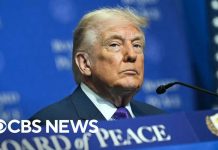
The DC Circuit Court has just handed President Trump a decisive victory, clearing the way for the administration to halt billions in foreign aid—marking a turning point in the fight over unchecked government spending and executive authority.
Story Highlights
- Court lifts injunction, allowing Trump administration to suspend or cut foreign aid for 2024.
- Ruling signals a shift in the balance of power between Congress and the presidency over federal spending.
- Billions in global health and humanitarian programs face immediate funding uncertainty.
- Advocacy groups vow further legal action as debate over U.S. global engagement intensifies.
Appeals Court Empowers Executive Authority on Foreign Aid
On August 13, 2025, the DC Circuit Court of Appeals vacated a lower court injunction that had forced the Trump administration to continue distributing congressionally appropriated foreign aid. This ruling grants President Trump the legal authority to freeze or slash billions in foreign assistance, including major funding for global health and HIV/AIDS programs. The court’s decision is seen by many as a landmark moment that enhances the executive branch’s ability to control federal spending, especially in areas where previous administrations bowed to legislative intent.
This outcome follows months of legal wrangling after President Trump, on his first day back in office, issued an executive order freezing all foreign aid for a comprehensive 90-day review. Advocacy groups responded swiftly, arguing that withholding funds already appropriated by Congress violated both the law and the very foundations of the U.S. constitutional system. In June, a district court sided with these organizations, issuing an injunction to require continued aid payments. However, the recent appellate decision has now reversed that order, putting the spending power back in the hands of the presidency for the time being.
Congressional Power Versus Presidential Discretion
The core of this legal battle centers on the age-old tension between the legislative and executive branches over the control of federal purse strings. Congress, through its appropriations process, traditionally dictates how taxpayer dollars should be spent, including on foreign aid programs administered by agencies like USAID. The executive branch, however, has some leeway in implementation. Under President Trump’s renewed vision, the administration has sought to dramatically expand that discretion, arguing that a realignment—and reduction—of foreign aid is necessary to prioritize national interests and address longstanding inefficiencies in U.S. global spending.
Advocacy groups, including the AIDS Vaccine Advocacy Coalition and the Journalism Development Network, contend that such actions violate statutory requirements and endanger critical humanitarian efforts. They are joined by congressional leaders who see this as a direct challenge to the Constitution’s grant of spending authority. The courts have now become the primary battleground, with the latest ruling tilting the scales toward presidential prerogative, at least for the current fiscal year.
Immediate Impact: Billions in Aid on the Chopping Block
The court’s decision has immediate and far-reaching implications. Nearly $4 billion earmarked for global health programs and over $6 billion for HIV/AIDS initiatives are now at risk of suspension or elimination. Non-governmental organizations, both in the U.S. and abroad, face sudden uncertainty regarding funding streams that support life-saving treatments, disease prevention, and humanitarian relief. The Trump administration’s move is likely to disrupt aid-dependent programs, potentially resulting in job losses within the non-profit sector and increased hardship for vulnerable populations worldwide.
Beyond the economic and social fallout, the ruling also raises critical questions about America’s global leadership role and the precedent it sets for future executive action. While humanitarian groups warn of dire consequences for millions who depend on U.S. aid, supporters of the administration argue that it is time to reevaluate and reprioritize how American resources are allocated overseas, especially in light of mounting national debt and domestic needs.
Legal and Political Ramifications for the Future
Legal experts caution that this case could set a precedent for expanded executive authority over congressional appropriations, potentially eroding the legislative branch’s constitutional power of the purse. The separation of powers is now under scrutiny, as scholars debate where the limits of presidential discretion should lie and whether this ruling opens the door to further executive overreach. Policy analysts note that this development aligns with President Trump’s broader agenda to reduce U.S. global engagement and assert stronger control over federal spending. Meanwhile, advocacy groups have announced their intention to pursue further judicial review, signaling that the legal fight is far from over.
Sources:
Public Citizen Litigation Group statement and case summary
GV Wire news report on court decision
KFF timeline of Trump administration foreign aid actions
WTOP coverage of appeals court ruling and aid amounts









